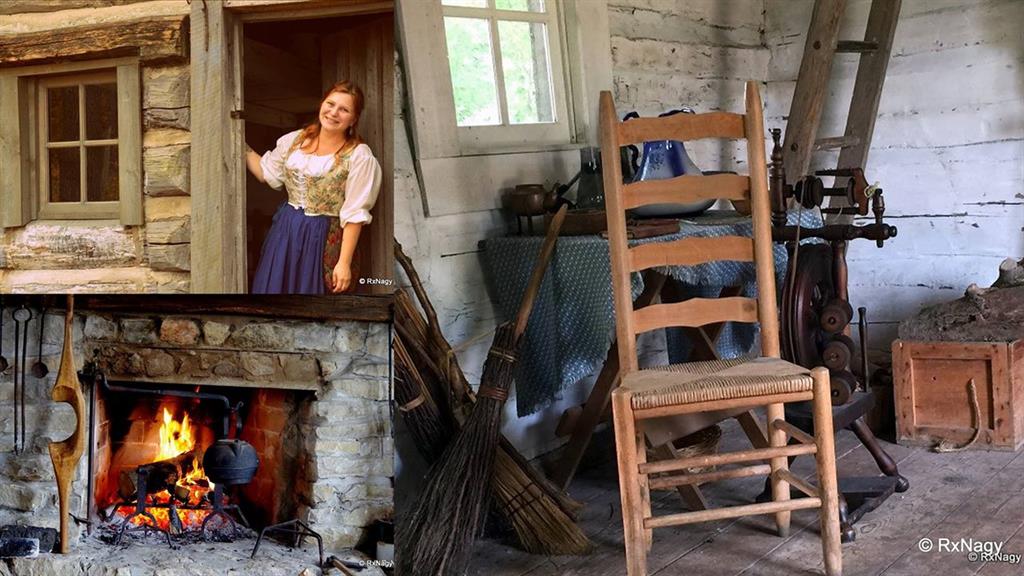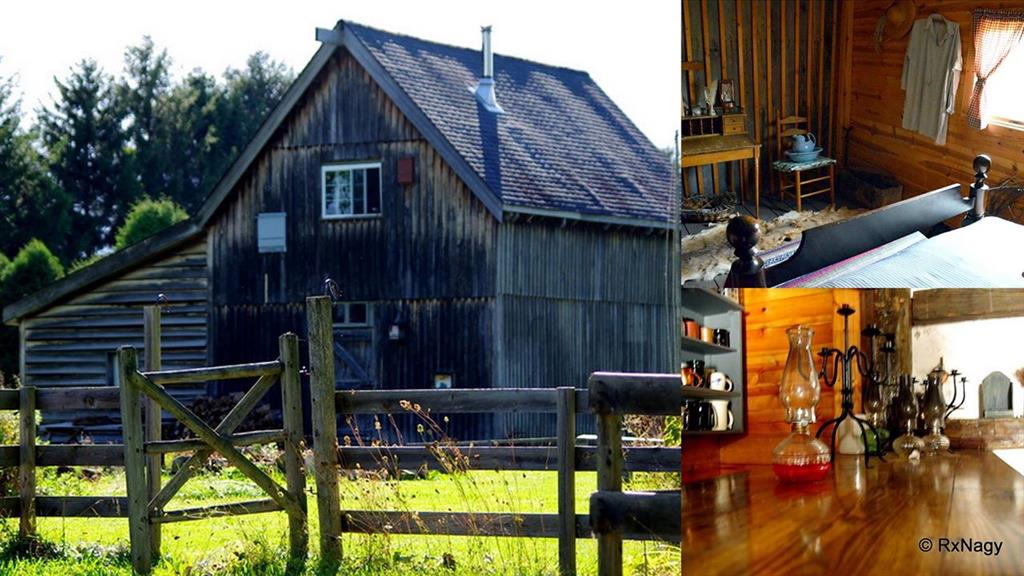Seven Eagles School Field Trip Tours
Visit Seven Eagles via WBGU-TV’s Scenic Stops School
field trip tours are one of our most popular activities where students come
into contact with authentic characters and re-live history of early Ohio's
Black Swamp Era with inter-active presentations in the Native Longhouse, the
Pioneer Log House, and the trapper/trader Catfish Inn. Extended tours may involve historical arts & crafts activities, catch and release cane-pole fishing, canoeing, or an environmental project. We have a lot of fun
doing school tours with students and we think they truly are important
learning experiences in the lives of students. If you are a parent or a teacher,
please share the information below with your child’s school. We are looking
forward to seeing Seven Eagles teeming with students eager to learn and have
fun this year!
The
school tours and field trips at Seven Eagles are interactive programs ranging
from a one-hour tour to a full-day tour. We do not lecture or give written
homework, instead we encourage students to compare, contrast, and become curious and explore the world
around them. Students are called to actively participate in the presentations,
think, ask and answer questions. Download the 2018 Registration Form (MS Word) (PDF) and the Field Trip Information (PDF).
Woodland Native Longhouse
Presentations
take place in the Native American Longhouse, where students will meet the
Ottawa warrior Lightfoot. Here, students are given the opportunity to discover
the material culture and lifestyle of the Woodland Indian tribes. They will be
shown artifacts and cultural items, will identify and touch real furs of
animals and learn about their use in trade, will sit around the fire and listen
to Lightfoot talk about his family life and his life as a warrior, his tools,
his house, his food, his clothing. Students will have the chance to touch all
the exhibition materials and understand their purpose.
This
year, we have added new items in the longhouse! As some of you may remember, we
recently built a new longhouse to better suit modern requirements. This winter,
volunteers have created new items: cattail mats, bark covers, gourd and birch
bark containers, household objects as well as many post-European contact items
that can be found in the longhouse or pioneer log house. Our most substantial
addition is the samples of native foods and demos of traditional outdoors
cooking: dried fruits, nuts, the three sisters (corn, beans, squash), wild rice
and many others. They will be presented time permitting. Please consider
booking an extra hour for a more detailed presentation.
1800 Pioneer Log Home
 Students
will then transition to witness the European influence in the Pioneer Log House
where they will meet Sandra, our Swedish pioneer. Students will learn about her
struggle with nature as a pioneer woman, the influence of Native American
food-ways on her lifestyle, the items and traditions she brought from Europe,
clothing, trade items and their impact on Native American communities. Again
depending on time, students will have the chance to have a hands-on learning
experience: churning butter, carrying water on a yoke, spinning wool, trying on
different trade-era clothing items, compare different cooking pots and
utensils, and maybe even smell fresh bread cooking in the oven. Students
will then transition to witness the European influence in the Pioneer Log House
where they will meet Sandra, our Swedish pioneer. Students will learn about her
struggle with nature as a pioneer woman, the influence of Native American
food-ways on her lifestyle, the items and traditions she brought from Europe,
clothing, trade items and their impact on Native American communities. Again
depending on time, students will have the chance to have a hands-on learning
experience: churning butter, carrying water on a yoke, spinning wool, trying on
different trade-era clothing items, compare different cooking pots and
utensils, and maybe even smell fresh bread cooking in the oven.
1790’s Circa Catfish Inn
 Catfish
Inn is the third venue for students to encounter the original bed-and-breakfast
community meeting hall. This replica 1790’s Scottish Tavern/Inn exemplifies
where life becomes community as a gathering place for business, social
activity, refreshment and accommodation. The City Tavern in Philadelphia was
the site of the first continental congress and the drafting of the Declaration
of Independence. The Virginia legislature met in the taverns of Williamsburg.
Inns were the hub of government, the post office, learning the prices of
commodities, entertainment, transition in measurement from weight scales to
spoons and cups, and of course, the beginning of fast food, saloons, and
hotels. Catfish
Inn is the third venue for students to encounter the original bed-and-breakfast
community meeting hall. This replica 1790’s Scottish Tavern/Inn exemplifies
where life becomes community as a gathering place for business, social
activity, refreshment and accommodation. The City Tavern in Philadelphia was
the site of the first continental congress and the drafting of the Declaration
of Independence. The Virginia legislature met in the taverns of Williamsburg.
Inns were the hub of government, the post office, learning the prices of
commodities, entertainment, transition in measurement from weight scales to
spoons and cups, and of course, the beginning of fast food, saloons, and
hotels.
Lunch…if
you bring your lunch, is outdoor s in nice weather at picnic tables and indoors
in wet or cold weather in our heated Marlow Hall. The hall seats 100 at tables
and is embellished with local deer mounts, a wild turkey and illustrations of
Native Americans, maps and foods along with a collection of books for browsing.
After
the tour and lunch… it’s play time! Traditional games, sports and entertainment
are an important aspect of Native life and also a learning experience. It is an
exercise in concentration, competition, intelligence and little strength. Don’t
miss the opportunity to play double-ball or throw tomahawks with Lightfoot and
friends! You may have a chance to win an arrowhead from Lightfoot! School Field Trip Tour Details
All
school tours are arranged on a reservation basis and are scheduled on a
first-come first-serve basis. Unless there are excessive down pours and
lightning, flooding or a blizzard, school tours are usually not cancelled by
Seven Eagles. The Natives and Pioneers lived here and had to deal with the
elements. Tours include walking outdoors between venues that are heated by real
wood fires. Many times, the weather in the Toledo-Lucas County area is
different than the other side of the Maumee River-Wood County area. Period
dress reenactors conduct the tours and usually there is one re-enactor per
group of approximately 20 students, two re-enactors for groups 40 and so on.
Minimum number of students in a group is 20. The Seven Eagles cell phone
(419-290-0995) may be called for questions the night before or morning of, for
weather conditions or information.
Parents
and teachers: be aware this is mainly an outdoor living history venue and
students must be prepared to spend time outdoors and indoors by the fires.
Please make sure students are dressed appropriately for the weather with coats,
boots or umbrellas.
Fees
& Tour Descriptions: Range from $2.50 per child for the one-hour tour, to
$10.00 per student for an all-day six-hour tour/field trip. Detailed
information about what is included in each tour may be found below.
One-hour
tour — priced at $2.50 per child, is advisable for pre-school and kindergarten
students only. This tour focuses on the Native American Village area with
hands-on artifacts, but includes a brief introduction/overview of Pioneers.
Two-hour
tour — priced at $4.50 per student, is the most popular due to bus and lunch
schedules. Additionally, you may bring lunch, throw tomahawks and play the
games. Tours focus on the 1600-1840 timeline or first-contact period whereby
trappers, traders and pioneers came into contact with Native Americans. The
tour includes approximately a one-hour tour of the Native area and a one-hour
tour of the pioneer area, both of which have hands- on artifacts. Following
lunch (if brought,) students play Native and pioneer games including: tomahawk
throwing, double ball, stilts, two-person tug-a-war or three-legged sack races.
Plan on three hours total for this tour.
Three-hour
tour — priced at $6.00 per student, includes an extended version of everything
mentioned in the two- hour tour with more in-depth focus on historical areas
and venues. Plan on four hours total with lunch and games
Four-hour
tour — priced at $7.50 per student, includes the expanded version of everything
mentioned in the two and three-hour tours plus more edible plant and
environmental information. Plan on 4 1/2 to 5 hours total with lunch and games.
All-day
trip (six-hour tour/field trip) priced at $10.00 per student, includes the
expanded version of everything mentioned in the two to four-hour tours plus
your groups’ choice of: cane-pole fishing and canoeing or an arts/crafts
project (choice of weaving, necklaces, quill pen & ink writing/drawing).
Rabbit skin pictographs may also be available depending on current pricing.
1850’s Circa Trading Post
While
some students are playing games outdoors, some students may want to buy a
souvenir for their friends or visit the museum gift shop. The Trading Post
Museum/Store is available (with advance notice) to all groups following their
guided tour. It contains souvenir items such as: flutes, whistles, tops,
feathers, jewelry, beads, arrowheads, gourds, etc., ranging in price from .05
to $3.00 average and up. The Museum itself contains original Native American
and Pioneer items on display, but not for sale. Traditional Arts or Crafts Projects Additional
make-it-take-it arts and crafts projects in conjunction with your curriculum
studies may be coordinated and scheduled for a fee with any tour above (some
may be included in all day tours). For example, Feather quill and parchment calligraphy for
$3.00, Trade bead and arrowhead necklaces for $3.00, Rabbit skin pictographs
are $6-10.00 each (depending on availability) and these and various other items
may also be purchased in the Trading Post during lunch/games activities.
Special
demonstrations in the Blacksmith Shop, black powder shooting, archery, fishing
and canoeing may be scheduled during the three-hour and up hourly tours in lieu
of other activities according to availability and advance notice. Seven Eagles’ Historical
Environmental Property
Special
note must be given to the entire venue that is an environmental center as well
as an historical center. The forty-acre piece of property is home to endangered
species of flora and fauna. The native habitat is an ecosystem and is expected
to be respected. No insects are to be killed or captured, fish caught must be
returned to the pond, wildflowers enjoyed and not picked so they may thrive and
be enjoyed by all. Chemicals are not used on the property to control invasive
species or weeds that are truly wildflowers or herbs – many used in traditional
medicines.
Special In-school or Community Center
Visits
Special
visits from one-hour to full-day(s) may be arranged for your school or
community center whereby Seven Eagles re-enactors may come to speak,
demonstrate, conduct hands-on activities or set-up an actual conical wigwam
camp outdoors or indoors with students or the community. All visits are
individually coordinated to fulfill your needs or curriculum. Prices vary on
duration, materials, travel and complexity of set-up. Please call Lightfoot at
419-290-0995 to discuss your ideas, needs and arrangements.
Don’t
forget to like us on Facebook and check out our albums for pictures of the
facilities where the activities will take place. If you have any
suggestions/inquiries/requests for special programs, please contact Martin Nagy
at 419- 290-0995 or martinnagy@aol.com to
discuss details.
|